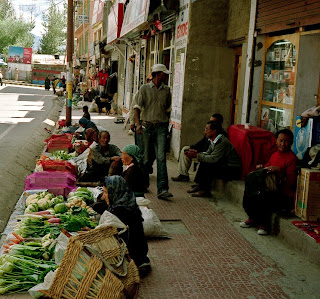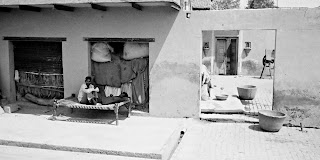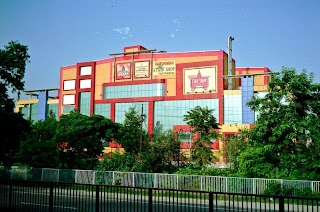So it's all about poverty today. This will be slightly tangential to my normal subject matter but based around my observations in India. This may also come across as a little controversial, if you're not up for that, look away now.
 Ladakhi market, August 2008
Ladakhi market, August 2008Farming seems to be a communal activity in the area, even if land may be individually owned
During the course of just a couple of weeks, I saw two very different (maybe 3) sides of India. Ladakh is a very pleasant place: beautiful country, pleasant weather (at least in summer) and a Buddhist culture that is tolerant and cooperative. There was also the extravagant excesses of the Taj Mahal and the Mughal palaces.
And then there is the poverty - the depressing, grinding poverty of newsreel. the worst part of the poverty, however (and something on which every visitor to India comments) is the squalor. Outside of Ladakh, the areas we saw were, quite frankly, filthy and piled with rubbish. Not another poor area in the world looks as bad as this, regardless of the levels of poverty.
 Open plan living, India, August 2008
Open plan living, India, August 2008Ramshackle, untidy houses seemed to be the norm out in the country villages
Civic cleanliness seems to be the first step in alleviating poverty. Which leads to my point. Is the ability to raise out of poverty, connected to a communal desire to do so? Places that seem to improve, also seem to have people coming together to help keep the place nice. When there is no longer care about the surroundings (and by inference, the well-being of neighbours' environment), then there develops the downward spiral. Whilst there are signs of India developing economically, it seems to be individually centred. I cannot recall anywhere else where brand new shopping malls get built between shanty towns. Total development of areas (or total neglect) seem to be the norm elsewhere.
 New shopping mall, India, August 2008
New shopping mall, India, August 2008On the next plot was a shanty town. This was a single beacon to consumerism in an obviously deprived area.
If we want to end poverty, maybe we all need to take more care of our surroundings and pass the good habits on. It may seem simplistic, but I believe that the desire to improve things for others, as well as ourselves, is the first step to making them happen.






indeed. what we have here in the philippines is both similar and different.
ReplyDeletefor now, i turn to sites like freerice, kiva, and goodsearch, as ways to help alleviate poverty online.
saw this post via the front page of blog action day. it's great that you're participating. :)